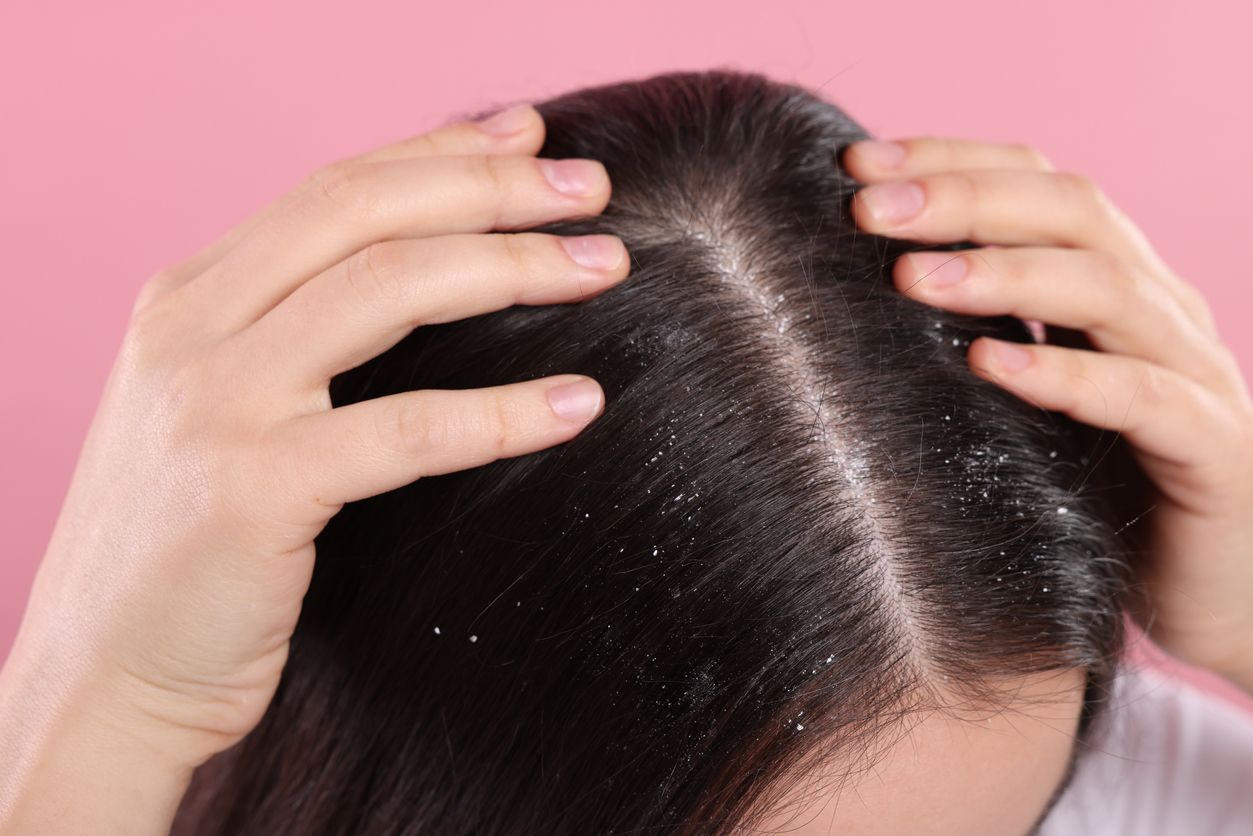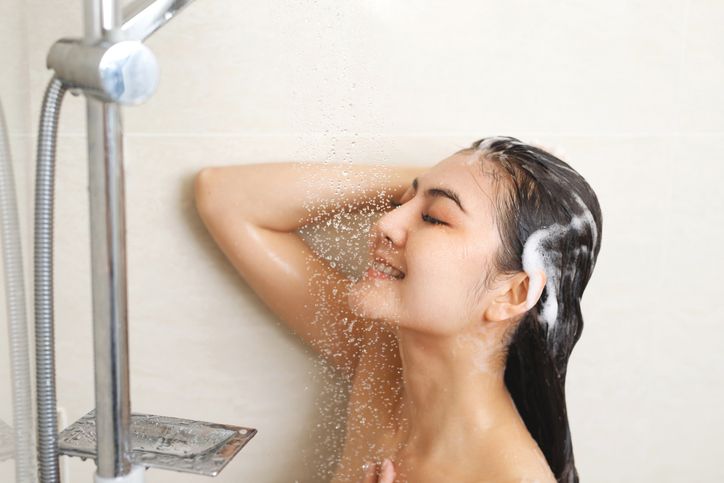
- Home
- Trend
- Weight Loss Strategies
- Acne Tips
- Hair Health Information
- Blemish Removal Tips
- Acne Scar Removal Tips
- Muscle Building Techniques
- Intimate Care Tips
- Postpartum Intimate Care
- Eye Bags Wiki
- Tips for Face Slimming
- Secret of Permanent Hair Removal
- Breast Enlargement Tips
- Cure to Snoring
- Marionette Lines
- Skin-Tightening Secrets
Is your hair feeling limp and lifeless, and are you noticing more hair in the drain than usual? These could be signs of a weak scalp and hair. But don't worry, fellow hair warriors! By understanding the root causes and implementing a strategic hair care routine, you can strengthen your scalp and transform your locks into a healthy, voluminous mane.
What's Making My Hair Scalp So Weak and Causing Thinning Hair?

A weak scalp can lead to various hair problems and is influenced by both internal and external factors.
Internal Factors
Internal factors play a crucial role in the overall health of your scalp, and their impact can be profound. Here’s a more detailed look at how these internal factors contribute to scalp health:
1. Nutritional Deficiencies
Nutritional deficiencies are one of the most common internal factors affecting scalp health. The scalp, like any other part of the body, relies on a steady supply of essential nutrients to function properly. When the diet lacks key vitamins and minerals, the scalp's ability to maintain healthy hair follicles is compromised.
• Iron Deficiency: Iron is vital for producing haemoglobin, a protein in red blood cells that carries oxygen to all parts of the body, including the scalp. Insufficient iron levels can lead to reduced oxygen supply to the hair follicles, weakening them and leading to hair thinning and loss. Symptoms of iron deficiency include brittle hair, pale skin, and fatigue.
• Vitamin D Deficiency: Vitamin D is essential for the creation of new hair follicles. It plays a role in the hair growth cycle and helps regulate the expression of genes involved in hair growth. A deficiency in vitamin D can lead to scalp issues such as dryness and hair loss. Vitamin D is naturally synthesised when the skin is exposed to sunlight, but it can also be obtained from dietary sources such as fatty fish, fortified foods, and supplements.
• Omega-3 Fatty Acids: These essential fats are critical for scalp health. They help maintain the lipid barrier of the scalp, keeping it hydrated and preventing dryness and flakiness. Omega-3 fatty acids also have anti-inflammatory properties that can help soothe an irritated scalp. They can be found in foods like fish, flaxseeds, and walnuts.
2. Hormonal Changes
Hormonal fluctuations significantly impact scalp health and can lead to various scalp conditions. Several life stages and conditions can trigger these changes:
• Pregnancy: During pregnancy, elevated levels of hormones such as oestrogen and progesterone can lead to changes in hair growth patterns. While some women experience thicker, more lustrous hair due to prolonged anagen (growth) phase, others might experience scalp sensitivity and changes in hair texture post-pregnancy, leading to temporary hair shedding (telogen effluvium).
• Menopause: The hormonal shifts during menopause, particularly the decrease in oestrogen levels, can lead to scalp dryness and hair thinning. Oestrogen helps to keep hair in its growth phase, and lower levels can result in increased hair shedding and a more noticeable scalp.
• Birth Control Pills: Hormonal birth control methods can alter the body's natural hormone levels, affecting hair growth. Some women might experience hair thinning or increased hair shedding when starting or stopping birth control pills due to changes in oestrogen and progesterone levels.
3. Underlying Health Conditions
Certain medical conditions can affect scalp health:
• Thyroid Disorders: Both hypothyroidism (underactive thyroid) and hyperthyroidism (overactive thyroid) can lead to scalp problems and hair loss. The thyroid hormones regulate metabolism and affect the health of hair follicles. Imbalances can result in dry, brittle hair and an increased rate of hair shedding.
• Autoimmune Diseases: Conditions like lupus and alopecia areata involve the immune system attacking healthy hair follicles, leading to patchy hair loss and scalp irritation. Managing these conditions often requires medical intervention to control the immune response and reduce inflammation.
External Factors
External factors play a significant role in weakening the scalp and impacting overall hair health. Here’s a detailed exploration of how these factors contribute to scalp issues:
1. Harsh Chemical Treatments
Chemical treatments can be incredibly damaging to the scalp:
• Hair Dyes: Frequent use of hair dyes can strip the scalp of its natural oils, leading to dryness and irritation. The chemicals in dyes, particularly ammonia and peroxide, can alter the scalp’s pH balance, making it more susceptible to damage. Prolonged exposure to these chemicals can result in scalp inflammation and an increased risk of allergic reactions.
• Chemical Relaxers and Perms: These treatments involve strong chemicals that break and reform the hair's bonds to change its texture. This process can be extremely harsh on the scalp, leading to chemical burns, dryness, and irritation. Over time, repeated use can weaken the scalp and hair follicles, contributing to hair thinning and loss.
2. Heat Styling Tools
Excessive use of heat styling tools can severely affect scalp health:
• Blow Dryers, Flat Irons, and Curling Irons: The high temperatures from these tools can dehydrate the scalp, stripping it of essential moisture and oils. This can cause scalp inflammation and exacerbate existing conditions such as dryness and flakiness. Using these tools frequently without proper heat protection can damage both the scalp and hair shaft, leading to brittle, weak hair and an irritated scalp.
3. Tight Hairstyles
Certain hairstyles can put undue stress on the scalp:
• Braids, Ponytails, and Extensions: Tight hairstyles can exert significant pressure on the scalp and hair follicles. This constant tension can lead to a condition known as traction alopecia, where hair is pulled out from the root, causing localised hair loss and scalp pain. Over time, this can weaken the hair follicles and contribute to permanent hair loss if the tension is not alleviated.
4. Improper Hair Care Practices
Daily hair care routines can also impact scalp health:
• Harsh Shampoos and Over-washing: Using shampoos with harsh chemicals or washing hair too frequently can strip the scalp of its natural oils, disrupting its moisture balance. This can lead to a dry, irritated scalp that is more prone to flakiness and sensitivity. It’s essential to use mild shampoos suited for your scalp type and to wash your hair as needed to maintain a healthy balance of natural oils.
• Aggressive Brushing or Combing: Vigorous brushing or combing can cause mechanical damage to the scalp, leading to friction and micro-tears. This can exacerbate scalp sensitivity and contribute to hair breakage. It’s important to use gentle techniques and tools designed to minimise scalp stress.
5. Environmental Factors
External environmental conditions can also affect scalp health:
• UV Radiation: Prolonged exposure to the sun’s UV rays can cause scalp sunburn, leading to inflammation and damage to the scalp cells. Over time, this can weaken the hair follicles and contribute to hair loss. Wearing hats or using hair products with UV protection can help shield the scalp from harmful rays.
• Pollution: Environmental pollutants can settle on the scalp, clogging pores and leading to irritation and inflammation. Pollutants can also contribute to oxidative stress, which weakens hair follicles and impacts hair growth. Regularly cleansing the scalp and protecting it from environmental aggressors is crucial for maintaining scalp health.
• Harsh Weather Conditions: Extreme weather conditions, such as cold, dry winters or hot, humid summers, can affect the scalp's moisture balance. Cold weather can cause dryness and flakiness, while hot weather can increase sweat and oil production, leading to clogged pores and irritation. Adapting your hair care routine to suit the weather conditions can help maintain a healthy scalp.
Take Care of Your Scalp and Boost Hair Growth

Addressing weak scalp conditions requires a comprehensive and holistic approach that encompasses various aspects of scalp care and maintenance to keep your hair strands strong. Here's an elaboration on each point:
1. Nutritional Support
A well-rounded diet plays a crucial role in promoting scalp health and supporting optimal hair growth. Essential nutrients such as iron, vitamin D, and omega-3 fatty acids are particularly important for maintaining a healthy scalp environment. Iron deficiency can lead to scalp dryness and hair loss, while vitamin D supports the production of new hair follicles.
Omega-3 fatty acids help nourish the scalp and improve hair texture. Including foods rich in these nutrients, such as leafy greens, fish, nuts, and seeds, can significantly benefit scalp health.
2. Gentle Hair Care
Using mild and gentle hair care products is essential for maintaining a healthy scalp. Harsh shampoos, especially those containing sulphates, can strip the scalp of its natural oils, leading to dryness, irritation, and potential inflammation. Opt for sulphate-free shampoos that are suitable for your scalp type.
Additionally, avoid over-washing your hair and using excessively hot water, as these practices can further dehydrate the scalp and weaken its protective barrier.
3. Protective Styling
The way you style your hair can impact scalp health. Choose hairstyles that minimise tension on the scalp and avoid tight hairstyles that pull on the hair follicles.
Excessive tension from hairstyles like tight ponytails, braids, or buns can lead to scalp discomfort, hair breakage, and even traction alopecia. Opt for looser styles that allow the scalp to breathe and maintain its natural elasticity.
4. Limit Heat Exposure
Heat styling tools like blow dryers, flat irons, and curling irons can cause damage to the scalp and hair shaft if used excessively. Limit the frequency of heat styling and always use a heat protectant spray or serum before applying heat to your hair.
This helps shield the scalp and hair from thermal damage, dryness, and breakage. Additionally, use these tools on lower heat settings whenever possible to minimise potential harm.
5. Environmental Protection
Environmental factors such as sunlight and pollutants can also affect scalp health. Wear hats or use hair products with built-in UV protection when exposed to prolonged sunlight to prevent scalp sunburn and damage. After exposure to pollutants or harsh environmental conditions, rinse your scalp thoroughly to remove any residue that may accumulate and irritate the scalp. Using clarifying shampoos occasionally can also help remove buildup and maintain scalp cleanliness.
免費體驗
F8 Hair Regrowth Treatment
1 Minute Self-Registration
Date should not be before minimal date
Building a Hair Care Routine for Strength with F8 Hair Regrowth Treatment
Weak scalp conditions can significantly impact hair health, leading to issues such as hair thinning, breakage, and hair loss. The F8 Hair Regrowth Treatment offers a cutting-edge solution to these problems by focusing on improving scalp health and stimulating hair growth.
How F8 Hair Regrowth Treatment Helps with Weak Scalp Conditions
Enhanced Blood Circulation
The F8 Hair Regrowth Treatment uses low-energy laser beams to enhance blood circulation in the scalp. Improved blood flow ensures that essential nutrients and oxygen are effectively delivered to hair follicles. This nourishment strengthens the follicles, promoting healthier and stronger hair growth.
Stimulation of Hair Follicles
Weak scalp conditions often lead to inactive or shrinking hair follicles. The F8 treatment specifically targets these follicles, using laser technology to stimulate and rejuvenate them. By reactivating dormant follicles and improving their function, the treatment helps to reverse hair thinning and promote new hair growth.
Promotion of Nutrient Absorption
Healthy hair growth relies on the proper absorption of nutrients. The F8 Hair Regrowth Treatment supports this by ensuring that hair follicles receive an adequate supply of vitamins and minerals. This enhanced nutrient delivery system strengthens the scalp and hair, reducing further hair loss and encouraging noticeable hair growth.
Reduction of Scalp Inflammation
Scalp inflammation can contribute to hair loss and weaken the hair’s structural integrity. The F8 treatment helps to reduce inflammation by improving overall scalp health. This creates a more conducive environment for hair growth and reduces the risk of hair follicle damage.
Complementing Existing Hair Care Practices
While traditional hair care routines focus on external hair health, the F8 Hair Regrowth Treatment addresses the underlying scalp conditions that can lead to hair problems. By incorporating this advanced treatment into your routine, you enhance the benefits of other hair care practices, ensuring that your scalp and hair follicles are in optimal condition for growth.
Why Choose F8 Hair Regrowth Treatment?
The F8 Hair Regrowth Treatment offers a comprehensive approach to treating weak scalp conditions and promoting healthy hair growth. This state-of-the-art treatment not only addresses the symptoms of hair loss but also targets the root causes by improving scalp health. Whether you’re dealing with hair thinning due to hormonal changes, nutritional deficiencies, or external factors, the F8 treatment can help restore your scalp's health and vitality.
Fix Your Weak Hair Roots With Us!
In conclusion, the F8 Hair Regrowth Treatment stands out as an advanced and effective solution for those struggling with weak scalp conditions and hair loss. By enhancing blood circulation, stimulating hair follicles, promoting nutrient absorption, and reducing scalp inflammation, this treatment addresses the root causes of hair loss and supports overall scalp health. Incorporating the F8 treatment into your hair care routine not only halts further hair loss but also encourages noticeable hair growth, resulting in stronger, healthier hair.
If you're seeking a proven method to combat hair loss and restore your hair's vitality, the F8 Hair Regrowth Treatment offers a comprehensive approach that goes beyond surface-level solutions. Experience the benefits of this state-of-the-art treatment and take the first step towards achieving the healthy, vibrant hair you deserve. Don't let hair loss hold you back any longer—choose F8 and transform your hair care routine today.
F8 Hair Regrowth Treatment免費體驗
F8 Hair Regrowth Treatment
1 Minute Self-Registration
Date should not be before minimal date
FAQ

1. How can I repair damaged hair caused by frequent use of a hair dryer?
Frequent use of a hair dryer can lead to damaged hair due to excessive heat exposure. To repair and protect your hair, use a heat protectant spray before drying. Opt for a hair dryer with adjustable heat settings and use the lowest heat setting possible. Incorporate deep conditioning treatments into your routine once or twice a week to restore moisture and strengthen hair strands. Additionally, allow your hair to air dry partially before using the dryer to minimise heat damage.
2. What can I do to make my hair follicles stronger and reduce weak hair?
Strengthening hair follicles and reducing weak hair involves a combination of internal and external care. Ensure you're consuming a balanced diet rich in essential vitamins and minerals, particularly iron, vitamin D, and omega-3 fatty acids. Avoid tight hairstyles and excessive use of hair extensions, as they can put stress on the hair follicles. Regular scalp massages can also stimulate blood flow and promote stronger hair growth. Use gentle hair care products and deep conditioning treatments to maintain healthy hair and scalp.
3. Are there any specific treatments for frizzy hair and weak hair follicles?
Yes, there are several treatments available for frizzy hair and weak hair follicles. For frizzy hair, use hydrating shampoos and conditioners designed to smooth and control frizz. Deep conditioning treatments and leave-in conditioners can provide extra moisture and manageability. To strengthen weak hair follicles, focus on a healthy diet and avoid harsh styling practices. Products containing biotin, keratin, and other strengthening ingredients can help reinforce hair structure and improve follicle health.
4. How do hormonal factors affect hair health and what can be done to manage hair issues related to hormones?
Hormonal factors, such as those experienced during pregnancy, menopause, or due to conditions like thyroid imbalances, can significantly impact hair health. These hormonal changes can lead to hair thinning, shedding, and frizzy hair. To manage hair issues related to hormonal factors, consult a healthcare professional for appropriate medical advice and treatments. Maintaining a balanced diet, using gentle hair care products, and incorporating deep conditioning treatments can help mitigate some of the effects and promote healthier hair.
5. What causes a weak scalp and reduced hair thickness, and how can I improve it?
A weak scalp and thinning hair often result from a combination of poor blood circulation to the scalp, buildup of oil or hair products, hormonal imbalances, stress, and nutritional deficiencies. Over time, frequent use of heat tools or harsh chemical treatments can also weaken the scalp environment and damage hair follicles. To improve the condition, it’s important to maintain a clean and healthy scalp, use gentle hair care products, and incorporate regular scalp massages to stimulate circulation. A diet rich in protein, iron, and essential vitamins—especially biotin and vitamin D—can also support hair growth from within. Reducing stress levels and being gentle with your hair, especially when styling, can make a big difference. If the issue persists, it may be worth consulting a dermatologist to rule out underlying conditions.








